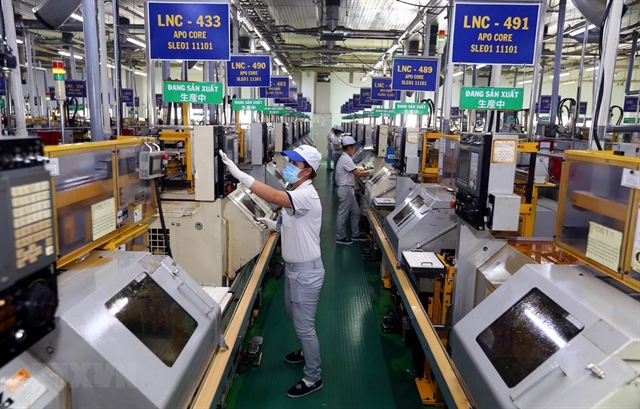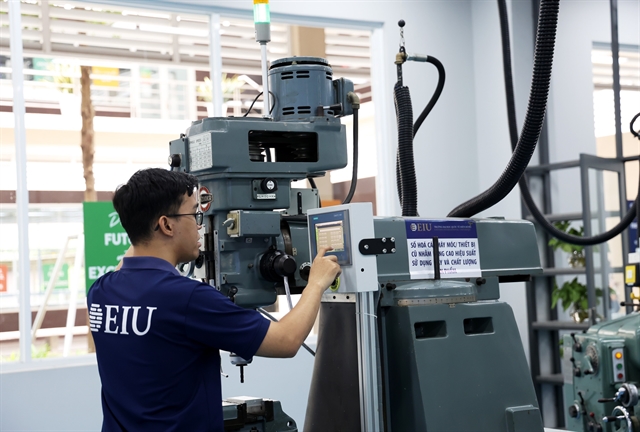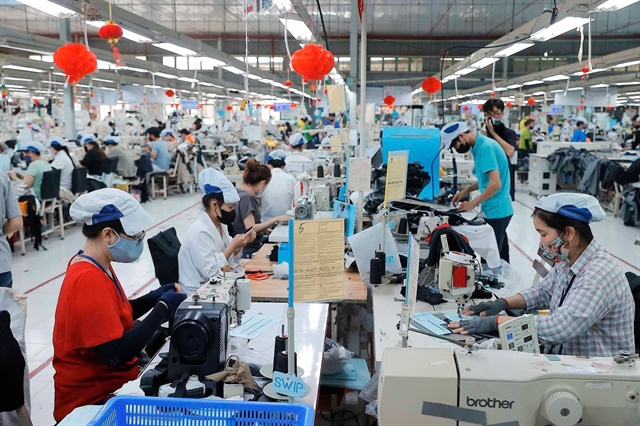 Society
Society

 |
| An expert works at the Centre for Innovation and Technology in Bình Dương southern province. — VNA/VNS Photo Hồng Đạt |
HCM CITY — Việt Nam commemorates the 50th anniversary of the liberation of the South and National Reunification this year, and the Mekong Delta – the southern delta of the nation – is marking significant progress and stands at the threshold of huge opportunities in the new era.
Therefore, assessing the current human resources status to meet development demands and implementing solutions to enhance the workforce quality, particularly in sectors where the region has strengths, is a key concern for managers and experts.
Key factor for development
The Mekong Delta is an economic region with many advantages and development potential.
Alongside natural resources, geographical location and advancements in science and technology, those in work are also considered a driving force for sustainable development.
Đào Duy Tùng, from the Faculty of Social Sciences and Humanities under the Cần Thơ University, said that significant progress has been made in education and training, and in enhancing the quality of human resources in the Mekong Delta in recent years.
At present, the training institutions network is quite comprehensive, with nearly 9,400 schools ranging from preschool to high school.
Furthermore, whereas before 2000 the Mekong Delta had only one university, today the region boasts 17 universities, several university branches, and many reputable colleges.
In the era of knowledge economy, he said, human resources were the decisive factor for the country’s prosperity, not just natural resources, so education and training and improving the quality of human resources must be made a priority.
The Mekong Delta has achieved a lot in terms of education and training, the educational institutions network is relatively widespread, but the education quality is still uneven among localities in the region.
The increasing demand for socio-economic development requires human resources with high professional qualifications, good social skills and a workforce which can quickly adapt to changes in the labour market.
Associate Professor Nguyễn Thanh Bình, from the Institute for Development Studies of the Mekong Delta under the Cần Thơ University. He said that data from competent authorities showed that the propo shared the same opinion that the educational and training facilities network and workforce quality is paramount. He said that data from competent authorities showed that the proportion of workers with technical expertise in the region has increased significantly but is still low compared to the whole country.
In just ten years (2012 - 2022), the proportion of workers with university degrees or higher in the region was up from 3.4 per cent to about 6.7 per cent, but that is much lower than the national average of about 11.9 per cent.
Looking at the workforce in the field of eco-agricultural tourism, Phan Đình Huê, from the Vòng Tròn Việt Tourism Company, commented that human resources in the delta are mainly farmers, who do not have many skills in providing services, especially high-end tourism services.
Therefore, although it is one of the earliest agricultural tourism regions in the country, the ability to attract long-term, high-spending visitors to agro-agricultural tourism in the Mekong Delta still faces many obstacles.
Training facilities in the region also do not have practical facilities for agricultural tourism. This leads to the situation that although human resources are abundant, there is still a lack of personnel with in-depth expertise in eco-agricultural tourism in many localities.
New development requirements
 |
| Skilled workers at a garment plant in Ninh Thuận Province. — VNA/VNS Photo Minh Quyết |
The Mekong Delta, along with the whole country, is entering a new era, an era of national development.
Development goals can only be realised when the workforce meets development requirements and effectively applies scientific and technological advances associated with digital transformation.
Lâm Thị Kho, an expert of the Regional Political Academy Region 4 under the Hồ Chí Minh National Academy of Politics, said that developing human resources in the Mekong Delta was part of a national human resources strategic goal.
Therefore, there should be effective policies and solutions to improve the human resources quality to meet the socio-economic development requirements, ensuring national defence and security in the region.
In particular, it is necessary to upgrade educational and training facilities and promote regional links in realising human resource development.
The current increase in colleges, universities and vocational schools in the region is also an appropriate policy so that students in rural areas do not have to move to big cities to study, helping reduce costs for families, encouraging them to allow their children to study at higher levels.
The region needs to promote activities to improve the quality of education and training, and colleges and universities improve assessment towards regional links in implementing high-quality human resources training, she said.
At the same time, career orientation should be promoted in accordance with the actual needs of society.
Regarding solutions to improve the quality of the workforce, Associate Professor Nguyễn Thanh Bình said that the development strategy in the region showed a trend of transforming the economy towards reducing the proportion of those working in agriculture and increasing numbers in industry, services and construction.
Labour and employment are shifting, not only according to the structure of the economy, but also towards modernity, intelligence and high quality in the digital age.
However in the Mekong Delta, agriculture still accounts for a high proportion of work, whereas the proportion of trained labour is still low.
Here, ecological conditions have also changed a lot due to the increasingly obvious impacts of climate change.
The goal of sustainable development of the Mekong Delta by 2030 was set out in the Regional Planning for the 2021-2030 period, with a vision to 2050, with a target that the rate of trained workers will be 65 per cent by 2030, of which 25 per cent have certificates, whereas the proportion of non-agricultural workers reaches 75-80 per cent.
To reach the goal, the region needs to promote vocational education and training for rural workers.
In particular, attention should be paid to occupations with local characteristics, cultural identity of the river region, and jobs that the market does and will need in the new era.
Nguyễn Thành Nhân and Hồ Thị Hà, from the Faculty of Political Science under the Cần Thơ University, proposed that to improve the workforce, localities need to focus on improving research capacity for scientific and technological organisations such as the Centre for Biotechnology, the Centre for Application of Scientific and Technological Advances, and the Centre for Aquatic Breeding Research.
These units play a core role in sharing scientific and technological activities between organisations and individuals in the Mekong Delta region with institutes, enterprises, scientific and technological organisations, while also attracting human resources to the region.
Leaders of Cần Thơ University said that they are focused on enhancing the quality of teaching staff and research experts.
To date, the university has over 200 professors and associate professors, not only elevating the quality of training and scientific research of the university, but also consolidating its core role in serving scientific research and socio-economic development of the Mekong Delta and the whole country. — VNS




